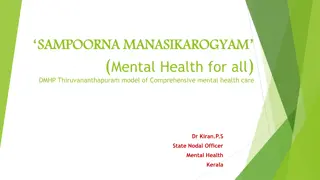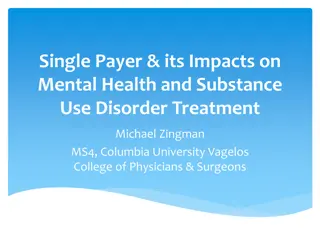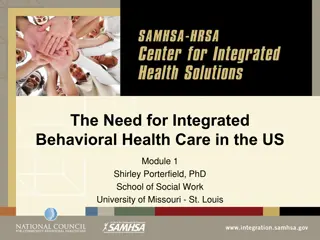Florida Children's Mental Health System of Care Expansion
Florida Children's Mental Health System of Care focuses on providing a spectrum of community-based services and supports for children and youth at risk for mental health challenges. The System of Care framework emphasizes family-driven, youth-guided, culturally and linguistically competent, and data-driven approaches to better support individuals in their homes, schools, and communities. Core values include being family-focused, child-centered, community-based, and culturally & linguistically competent.
Download Presentation

Please find below an Image/Link to download the presentation.
The content on the website is provided AS IS for your information and personal use only. It may not be sold, licensed, or shared on other websites without obtaining consent from the author. Download presentation by click this link. If you encounter any issues during the download, it is possible that the publisher has removed the file from their server.
E N D
Presentation Transcript
Florida Childrens Mental Health System of Care Expansion and Sustainability Grant FEATURING HIGH-FIDELITY WRAPAROUND CARE MANAGEMENT
What is a System of Care (SOC)? A spectrum of community-based services and supports for children/youth with or at risk for mental health or other challenges, and their families. The System of Care: Is organized into a coordinated network. Builds meaningful partnerships with families and youth. Addresses their cultural and linguistic needs. The SOC goal is to help them function better at home, in school and in the community.
What is the System of Care Framework? Family driven and Youth guided Home and Community Based Strengths based and individualized Culturally and Linguistically Competent Coordinated across systems and services Connected to natural helping networks Data driven and outcome oriented Building Systems of Care, A Primer, Sheila Pires
Core Values of a System of Care Family Focused: Families voice in the process of determining the types of services and supports they receive Child Centered: Youth have the right to be part of the decision making process in their own care Community Based: Services are provided in/close to home to minimize the need for costly inpatient stays Culturally & Linguistically Competent: Services and supports need to respect/reflect the cultural, ethnic and linguistic norms of the youth and family receiving services
Floridas Child Welfare Practice Model Engage the family Partner with all involved Gather information Assess and understand information Plan for child safety Plan for family change Monitor and adopt case plan
SOC State Level Governance and Personnel Statewide Advisory Team SAMH Staff State Agencies, MEs, Providers, Partners, Family and Youth Principal Investigator: Mary Schrenker Develops strategies to move the state toward full implementation Statewide Project Director: Steve Chapman Monitors progress and outcomes Wraparound Coordinator: Caryl Jefferson Champions SOC principles and values in practice Lead Family & Youth Coordinator: Kimberly Nester Provides support from respective agencies, communities CLC/Social Marketing Coordinator: Dekywan Debose
SOC Local Governance and Personnel Local Coordinating Committee Grant-Funded Staff at Each Site: State Agencies, MEs, Providers, Partners, Family and Youth Local/Site Coordinator Family Coordinator Develops strategies to move the community toward full implementation Youth Coordinator Monitors progress and outcomes Champions SOC principles and values in practice Provides support from respective agencies, community partners
Florida System of Care Strategic Goals Demonstrate Family and Youth Engagement Expand and Sustain an SOC-Driven Array of Services Implement High-Fidelity Wraparound Statewide Demonstrate System of Care Accountability
What SOC looks like in action: Maggie and Bob, married with children Billy (14), Davey (12) and Taylor (5). Billy may have trauma, acting out in school, is now involved with DJJ, a year behind in school. DJJ ordered restitution and therapy. Davey is ADHD, tough to slow down, school suggesting home- bound instruction. Taylor is the lost child. Bob, sober but abusive, with an investigation of domestic violence and a current services case, under court order for anger management. Maggie sees a psychologist for crisis intervention; depressed but refuses to see psychiatrist. Overwhelmed and at wit s end with Billy.
High Priority Populations Youth 0-21 with Severe Emotional Disturbances (SED) and those with early warning signs and symptoms of serious mental illness, including first episode psychosis, and their families. Transitional Youth with SED Juvenile Justice Residential Treatment School Expulsion and Drop Out Multi-system Involvement Child Welfare
Burden of Multi-System Care Management School System Care Management Plan Behavioral Health Care Management Plan Child & Family Care Management Plan Juvenile Justice Care Management Plan Child Welfare
Family Monthly Schedule Child Advocate 1x 2x 1x 4x 4x 2x 8x 4x 5x 31 Maggie s Psychologist Maggie s Psychiatrist Billy s therapist Billy s restitution services Appointments with Probation and School Sibling s therapy appointments Bob s anger management Other misc. meetings: Vocational, Housing, Medical Total:
Why Wraparound? Wraparound Care Management holds a system with multiple partners together, reducing fragmentation Simplifies system navigation for families and youth Engages families and children in designing (and re-designing) solutions that they can live with to reach goals Provides social supports, especially natural supports, to aid them Operationalizes System of Care Values and Principles in practice
Collaboration with Wraparound Care Management School System Behavioral Health Child & Family Wraparound Team Care Management Plan Juvenile Justice Child Welfare
Wraparound Guiding Principles: Culturally Competent Individualized Strengths Based Persistence Outcome Based and Cost Responsible Family Voice and Choice Team Based Natural Supports Collaboration (and Integration) Community Based
Payoff from the SOC Approach Children and youth served under previous SOC grants showed Improvement in functioning. Reduction in anxiety and depression. Improvement in educational outcomes. Reduction in contact with law enforcement. Reduction in suicidal thoughts and attempts. Reduction in average number of days in inpatient hospital settings. Broward County study of Wraparound with Child Welfare children showed some of the same benefits, plus a reduced risk of subsequent maltreatment.
Role of SOC in SAMH Long-Term Strategy FY 18-19 SAMH PRIORITY: Access to Recovery Oriented Systems of Care for Adults and Children GOAL: Enhance the system of care to shift from an acute care model to a recovery based model of care OBJECTIVE I: Implement System of Care and Recovery oriented best practices throughout the system of care
Questions? For more information, please contact: Steven.Chapman@myflfamilies.com Mary.Schrenker@myflfamilies.com

























